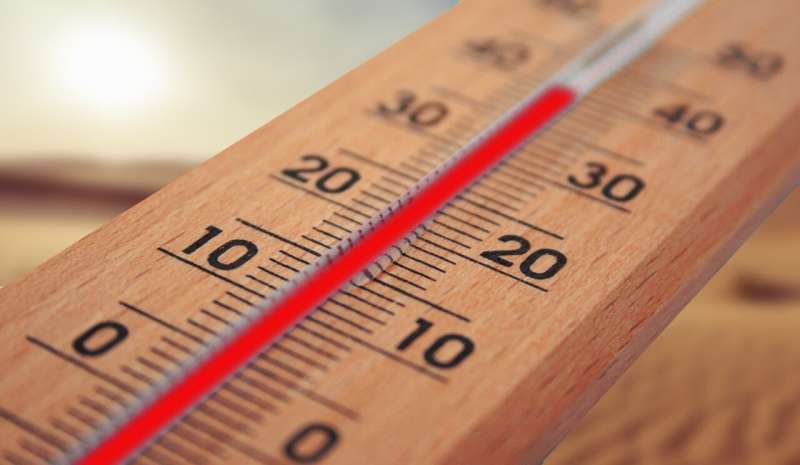This article has been reviewed according to Science X's editorial process and policies. Editors have highlighted the following attributes while ensuring the content's credibility:
fact-checked
trusted source
proofread
In the summer heat, know how to recognize—and prevent—heat stroke

The long, hot days of summer are here. While that can mean lots of fun in the sun for some, experts warn the extra warmth and exertion also carry the threat of heat-related illness, a problem they expect to increase as climate change spurs longer periods of extreme heat.
According to the World Meteorological Organization, global temperatures are expected to hit record levels in the next five years. Each year in the U.S., an average 702 deaths and 67,512 emergency department visits are due to heat, based on Centers for Disease Control and Prevention data.
Research shows that the more days there are of extreme heat—when temperatures feel like 90° Fahrenheit or higher—the more heat-related deaths occur, including cardiovascular-related deaths triggered by extreme heat.
But even a typical hot summer day can lead to heat-related illness, especially in humid areas, or if a person is overexerting themselves, said Dr. Michael Kurz, a professor and section chief of emergency medicine at the University of Chicago.
Heat stroke occurs when the body overheats and is unable to cool down. There are two types of heat stroke, Kurz said. The kind brought on by heat alone and the kind brought on by exertion in hot or humid weather. Both can be fatal.
"Non-exertional heat stroke can occur when you're in a very warm environment, or even if you're in a less warm environment but the humidity is above 75%," he said. "When you exert yourself, the body generates even more heat."
The body gets rid of excess heat primarily through sweat. But when there's too much heat, the body can't get rid of it efficiently and core temperature increases.
If body temperature reaches 106°F, "the basic chemical reactions in your brain don't work anymore," Kurz said. "Your heart rate goes up, you start to breathe quicker, there's an increased demand for oxygen. These are all things that happen because your body is trying to generate more blood flow to compensate for the increasing body temperature."
Other organs can begin to suffer, said Dr. Jason Tanner, a resident in emergency medicine at Yale New Haven Hospital, part of the Yale School of Medicine in Connecticut. "It creates a systemwide failure if it gets bad enough."
Heat-related illnesses range from the more minor heat exhaustion to life-threatening heat stroke, Tanner said. "Heat illness is a spectrum."
Signs that a person may be experiencing heat fatigue or exhaustion include heavy sweating, paleness, muscle cramps, fatigue, weakness, dizziness, headache, nausea, vomiting or fainting. Left untreated, heat exhaustion can progress to heat stroke.
Heat stroke can cause an extremely high body temperature (over 103°), rapid pulse, headache, dizziness, nausea, confusion and hot, dry skin that won't sweat. It also can cause a person to lose consciousness.
It's called "heat stroke" because people can exhibit symptoms, such as slurred speech or difficulty moving their limbs, that are similar to the symptoms of a regular stroke, Kurz said.
"It's not a stroke. But to a layperson, it may look like one," he said.
To prevent heat illness, Kurz advises limiting strenuous activities, such as yardwork or a long-distance run, to early in the day before the weather gets too hot, or late in the day when the sun's going down. When working outdoors, "wear cool, loose-fitting clothes and a hat," he said. "Stay in the shade, and take breaks."
Kurz also cautioned against drinking alcohol or caffeinated beverages while exposed to excessive heat. "Those things will dehydrate you. Water is the best thing to drink."
And, he said, especially when doing something strenuous outdoors, "be absolutely sure you are well hydrated so you can generate sweat to evaporate and offload that heat."
Heat exhaustion may be something that can be treated at home, Tanner said. "Recognize heat is affecting your body" and get out of the sun and into a cool area where there is air conditioning or a misting fan, and hydrate, he said.
But heat stroke requires calling 911, Tanner said. It's not only potentially fatal, it also can cause liver or kidney damage or permanent neurological problems.
Some people—such as infants, toddlers and adults 65 and older—are more susceptible to heat-related illness. That's because they may not be able to hydrate sufficiently or remove themselves from the heat without assistance, Kurz said.
Some medications or health conditions that lead to dehydration also increase the risk for heat-related illness. For example, some people with diabetes may have damaged nerves and blood vessels that affect their sweat glands and prevent their bodies from cooling down effectively.
As temperatures continue to climb, Kurz said, "know how to recognize the symptoms of heat-related illness and find ways to cool down."




















